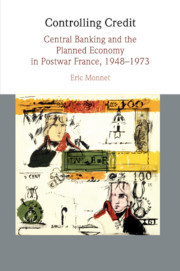Description
Controlling Credit
Central Banking and the Planned Economy in Postwar France, 1948–1973
Studies in Macroeconomic History Series
Author: Monnet Eric
Monnet analyzes monetary and central bank policy during the mid-twentieth century through close examination of the Banque de France.
Language: English
Subject for Controlling Credit:
Approximative price 43.23 €
In Print (Delivery period: 14 days).
Add to cart
Controlling Credit
Publication date: 10-2019
Support: Print on demand
Publication date: 10-2019
Support: Print on demand
Approximative price 120.27 €
In Print (Delivery period: 14 days).
Add to cart
Controlling Credit
Publication date: 11-2018
350 p. · 15.6x23.5 cm · Hardback
Publication date: 11-2018
350 p. · 15.6x23.5 cm · Hardback
Description
/li>Contents
/li>Biography
/li>
It is common wisdom that central banks in the postwar (1945?1970s) period were passive bureaucracies constrained by fixed-exchange rates and inflationist fiscal policies. This view is mostly retrospective and informed by US and UK experiences. This book tells a different story. Eric Monnet shows that the Banque de France was at the heart of the postwar financial system and economic planning, and that it contributed to economic growth by both stabilizing inflation and fostering direct lending to priority economic activities. Credit was institutionalized as a social and economic objective. Monetary policy and credit controls were conflated. He then broadens his analysis to other European countries and sheds light on the evolution of central banks and credit policy before the Monetary Union. This new understanding has important ramifications for today, since many emerging markets have central bank policies that are similar to Western Europe's in the decades of high growth.
Introduction; Part I. Institutionalizing Credit: Introduction to Part I: chronology and methodology; 1. French credit policies before 1945; 2. The nationalization of credit from 1945 to the late 1950s; 3. Development then gradual de-institutionalization: the 1960s and 1970s; Part II. Managing Credit: 4. Monetary policy without interest rates. Domestic macroeconomic effects and international issues of credit controls; 5. Blurred lines. The two faces of Banque de France loans to the Treasury (1948–73); 6. Financing the postwar Golden Age. The Banque de France, 'investment credit' and capital allocation; 7. The rise and fall of national credit policies. Implications for the history of European varieties of capitalism and monetary integration; Conclusion.
Eric Monnet is a senior economist at the Bank of France, a Professor in Economic History at the Paris School of Economics, and a research affiliate at the Centre for Economic Policy Research (CEPR).
© 2024 LAVOISIER S.A.S.




